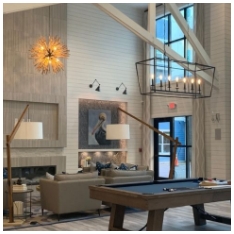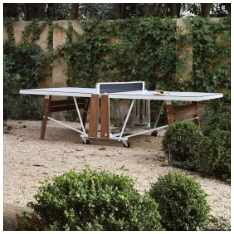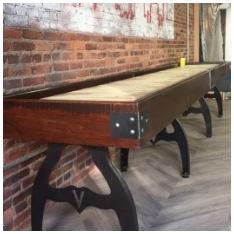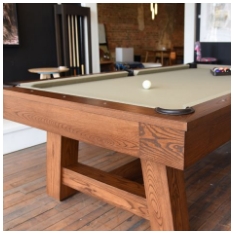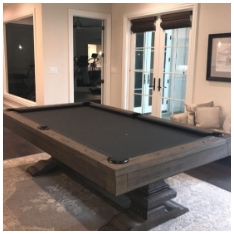Owning a pool table is a long-term investment that offers endless hours of entertainment. But, to keep your pool table in top condition, regular maintenance is essential. Neglecting care can lead to wear and tear, affecting gameplay and shortening the life of your table. By following a few simple tips, you can preserve its appearance and performance for years to come.
In this article, we'll discuss essential tips for taking care of your pool table, covering everything from cleaning the felt to maintaining the wooden frame and cushions.

Top Tips for Taking Care of Your Pool Table
Clean the Felt Regularly
The felt on your pool table is crucial to smooth gameplay, and keeping it clean is vital. Dust, chalk residue, and debris can accumulate over time, affecting the way balls roll across the surface.
Brush the Felt After Every Game
Using a soft-bristled pool table brush, gently sweep the felt after every game. This prevents dirt from embedding into the fabric and prolongs the life of the felt. Make sure to brush in one direction to avoid damaging the material.
Vacuum the Felt Weekly
In addition to brushing, vacuuming the felt with a low-suction handheld vacuum once a week helps remove stubborn debris. Avoid using a high-suction vacuum, as it can damage the felt.
Maintain the Pool Table Cushions
The cushions on your pool table are responsible for ensuring a lively rebound when balls strike the rails. Over time, these cushions can lose their bounce if not properly cared for.
Check for Cushion Wear and Tear
Inspect the cushions regularly for signs of wear or hardening. If the cushions are no longer providing the right bounce, it may be time to replace them.
Protect the Cushions from Moisture
Moisture can damage the cushions and affect their performance. Keep your pool table in a climate-controlled room to prevent the cushions from absorbing excess humidity.
Care for the Pool Table Pockets
Pool table pockets can wear down over time, especially if the table sees a lot of play. Regular care can help prevent unnecessary damage.
Inspect the Pockets for Tears
Check the pool table pockets regularly for signs of tearing or fraying, especially if your table has leather pockets. Promptly repair any minor damage before it worsens.
Keep Pockets Free of Excessive Weight
Avoid letting heavy items rest in or on the pockets, as this can cause them to sag. Encourage players not to lean on the table, especially near the pockets.
Protect the Wooden Frame
The wooden frame of your pool table adds to its overall durability and aesthetic appeal. Regular maintenance ensures that the wood stays in good shape.
Clean the Wooden Surface
Wipe down the wooden surfaces of your pool table using a soft, damp cloth. Avoid using harsh cleaning products that can strip the wood’s finish. For deeper cleaning, use a specialized wood cleaner.
Polish the Wood Annually
Polishing the wood with a high-quality furniture polish once a year helps protect the finish and gives your pool table a fresh, glossy look.
Control the Room's Environment
A pool table can be sensitive to its environment, especially when it comes to temperature and humidity.
Maintain Optimal Humidity Levels
Keeping your pool table in a room with consistent humidity levels is key to preserving the felt and cushions. Ideally, maintain a humidity level of 40% to 60% to prevent the wood from warping and the felt from becoming damp.
Avoid Direct Sunlight
Exposure to direct sunlight can cause the felt to fade and the wood to crack over time. Place your pool table away from windows or use blinds and curtains to minimize exposure.
Level Your Pool Table
Over time, your pool table can become uneven due to shifting floors or natural settling. Playing on an unlevel table can affect the accuracy of your shots.
Check the Level of the Table
Use a carpenter’s level to check your pool table’s balance. If it’s off, adjust the legs to restore evenness.
Call a Professional for Major Adjustments
If your table has shifted significantly, it’s best to call a professional to adjust the level. This ensures the table remains properly balanced without causing damage.
Conclusion: Keeping Your Pool Table in Top Shape
Taking care of your pool table doesn’t have to be complicated. By following these simple tips—cleaning the felt, maintaining the cushions, and protecting the wood—you can enjoy many years of smooth, uninterrupted gameplay. Regular maintenance not only preserves the appearance of your pool table but also ensures it continues to perform at its best.

